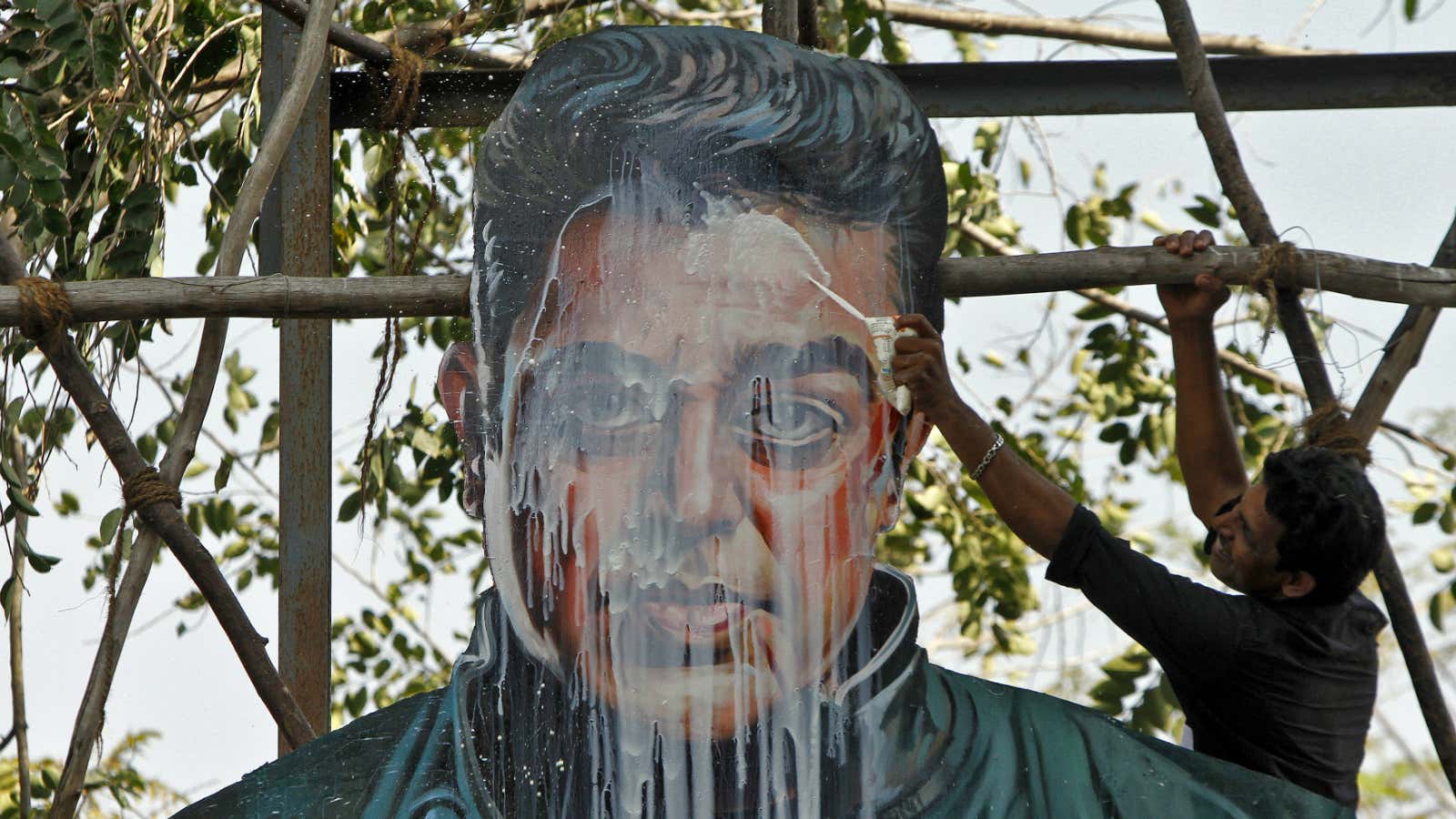Tamil actor Kamal Haasan is called Ulaga Nayagan, a global star, by fans in his home state of Tamil Nadu. Many may disagree over this supposed “global” appeal. But within India, the star could pull reasonable crowds, and not just in Tamil Nadu.
And fittingly, as he finally dived into active politics on Feb. 21, Haasan’s ambition soared beyond Tamil Nadu, catering to a broader south Indian identity.
The only star from the region who has raked in success in all the four dominant south Indian languages, besides Hindi, Haasan is eyeing a similar feat as a politician. If he pulls it off, the implications are deep for India as a whole.
On Feb. 21, besieged by thousands of his fans and supporters in Madurai, Haasan unveiled the name of his new party: Makkal Needhi Maiam (Centre for Justice for People). While his words espoused a Dravidian identity, his party’s symbol sought to set it free from the clutches of its long-time custodians.
“Dravidian”, in India’s political lexicon, includes all those who speak the four dominant south Indian languages, Tamil, Malayalam, Kannada, Telugu, and their various dialects. The identity emerged as a political force over a 100 years ago, most significantly under EV Ramaswamy, popularly known as Periyar. Between 1940s and 1960s, there was a push for a separate nationhood by the Dravidians, an idea now long forsaken. Meanwhile, the word Dravidian itself has become the sole preserve of political parties in Tamil Nadu, where the identity resonates the loudest.
Makkal Needhi Maiam’s symbol is made up of a circle of six interlocked hands representing the states of Tamil Nadu, Kerala, Karnataka, Andhra Pradesh, and Telangana, besides the union territory of Puducherry. In the middle is a black star—resembling a talisman.
So, symbolically at least, Dravidian politics has been pushed beyond Tamil Nadu’s borders for the first time in decades.
On the other hand, the bigger national parties like the Bharatiya Janata Party (BJP) and the Congress have been proponents—even if with varying intensity—of a larger national Indian identity subsuming regional ones.
Thanks to its legacy of India’s freedom struggle, the Congress has had a presence in southern India for long, even though it may be dwindling now. The BJP, meanwhile, has historically been a party entrenched in northern India, with little success in the south.
So the emergence of newer political outfits—on Dec. 31, Haasan’s colleague and phenomenally popular star, Rajinikant, announced his entry into politics—may not work well for the national parties.
“I like (Bhimrao) Ambedkar, (Mahatma) Gandhi, Periyar, (Jawaharlal) Nehru, Pinarayi Vijayan, (Arvind) Kejriwal, and even (Barack) Obama,” Haasan said at his party’s launch rally. He markedly left out the icons from the Hindu nationalist fold and even missed out prominent Dravidian leaders, signalling his brand of politics—neither majoritarian nor limited to Tamil Nadu.
The seething south
Haasan’s entry into politics could add momentum to forces fuelled by rising anger in southern India over perceived slights and unfair treatment.
In recent years, such voices have only gotten louder.
For instance, there was an uproar over a supreme court-ordered ban in January 2016 on Tamil Nadu’s traditional bull-taming sport of Jallikattu. “If you want a ban on Jallikattu, ban biriyani too,” Haasan himself had said then. Kerala was up in arms last year following the central government’s move to make cattle slaughter difficult.
Such was the outrage against such moves that Twitterati from Tamil Nadu, Kerala, and other states made #DravidaNadu—a country for Dravidians—a trending topic in May 2017.
In Karnataka, the central government’s push to have Bengaluru Metro signboards in Hindi drew flak. Several Andhra Pradesh politicians have, meanwhile, cited “injustice” by the BJP in the treatment meted out to their state.
There have also been serious debates over federal revenue sharing, wherein the better performing southern states alleged being punished with lower allocations.
Racially-tinted remarks made often by senior politicians from the north have only added to the fire.
Contradictions galore
Nevertheless, the southern states themselves have been at loggerheads often. They have been dogged by parochial narratives, particularly disputes over resource sharing.
While most leaders from the region have hitherto only extracted political capital by fanning these inter-state tensions, Haasan on Feb. 21 said, “People ask me what is my solution to the Cauvery (river water dispute) issue. I’ve answered this before. The problem is there is so much politicisation of the issue…there needs to be a fair dialogue.” Clearly, he was seeking applause from neighbouring Karnataka, a state that has for long been at loggerheads with Tamil Nadu over River Cauvery’s waters.
While the southern states have strong regional parties thriving on local identities, none has had a presence beyond its own state.
Haasan, who speaks six languages, wants his party to be the first to transcend these borders. Easier said than done.
